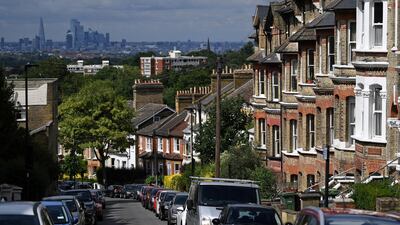Britain’s house prices are set to rise 2 per cent this year with no growth expected in 2021, after the coronavirus lockdown brought the country’s real estate market to a standstill at the height of the pandemic, according to Hamptons International.
The economic consequences of the crisis are expected to hit next year with prices set to remain flat, the property consultancy found, assuming a trade deal is agreed with the European Union and a vaccine becomes available in the first half of the year.
“The housing market’s strong start to 2020 soon came to a halt with the rise of Covid-19. But after seven weeks of lockdown the market began to recover quickly,” Aneisha Beveridge, head of research at Hamptons International, said.
“The market was buoyed by pent-up demand going back to 2016 as well as a rise in the number of households making lockdown-induced lifestyle changes, all topped off by a stamp duty holiday. We believe house prices are set to rise across Great Britain and will end 2020 having picked up from where they started at the beginning of the year.”
UK house sales rose 15.6 per cent in August following the roll-out of the government's Stamp Duty Land Tax (SDLT) holiday the previous month, which helped to protect almost 750,000 jobs in the housing sector and wider supply chain, HM Treasury data found earlier this month.
The August increase followed a 14.5 per cent rise in July as more people decided to buy a new home or move house because of UK chancellor Rishi Sunak’s SDLT break for residential properties worth up to £500,000 (Dh2.3 million) at the start of July, which runs until March 31 next year.
Average house prices jumped 3.4 per cent in the year to June with the average house price at £237,834, £8,000 higher than the same month last year, according to the Office for National Statistics.
Wales will see the strongest house price growth in 2020 at 3 per cent, according to Hamptons International, followed by London, Yorkshire and Humber and the North West of England at 2.5 per cent.
With mixed messages from the government around working from home, 12 per cent of remote workers are considering moving to a new location, with the majority looking at rural or coastal areas.
This may account for London being among the regions expected to see the biggest price falls next year. The capital is set for a 1 per cent decline in 2021, with the West Midlands set for the largest drop of 1.5 per cent, as the pandemic’s effect on the property market is driven by job losses.
Unemployment is set to peak in the first half of 2021, according to Hamptons International, following the end of Rishi Sunak’s furlough scheme, which will be replaced by the government's new jobs support measures from November 1.
“There are many risks on the horizon, including the consequences of a no-trade deal Brexit, a second wave of Covid-19 or a delay in the arrival of a vaccine. Yet if a vaccine, or an effective Covid-19 treatment become available more swiftly, a quicker economic recovery is still possible,” the study found.
As the economy recovers, house prices are expected to accelerate to 2.5 per cent in 2022 and 3.5 per cent the year after, equating to growth of 8 per cent over the next four years, Hamptons International said.
Britain’s more affordable areas will lead the price growth during that period, with prices in the North East set for an increase of 11.5 per cent by the end of 2023.
Rents will underperform house prices this year with falls of 1 per cent this year, followed by a further drop of 1 per cent in 2021 before a strong rebound kicks in. Low-income workers, who often rent, are more likely to have lost their jobs or suffered a salary cut than homeowners, in turn driving the price falls, particularly in London and the south of the country.
The number of £1 million-plus homes finding a buyer in August rose 105 per cent year-on-year, according to property portal Rightmove on Friday, a higher rate of increase than the market as a whole, where house sales increased by 61 per cent year-on-year. The activity in this segment is attributed to wealthy buyers moving to bigger houses or new locations during the crisis.
“This new data further suggests that those with significant equity are driving the current property market boom. As working from home becomes the norm, it is likely that there is increased competition for the largest homes in the most desirable locations. But the flip-side is that many lower earners and potential first-time buyers may have been priced out of the market,” said Nisha Vaidya, mortgage expert at Bankrate UK.
“Those looking to upgrade their existing property may need to act fast if they want to complete a move in this highly competitive marketplace.”


